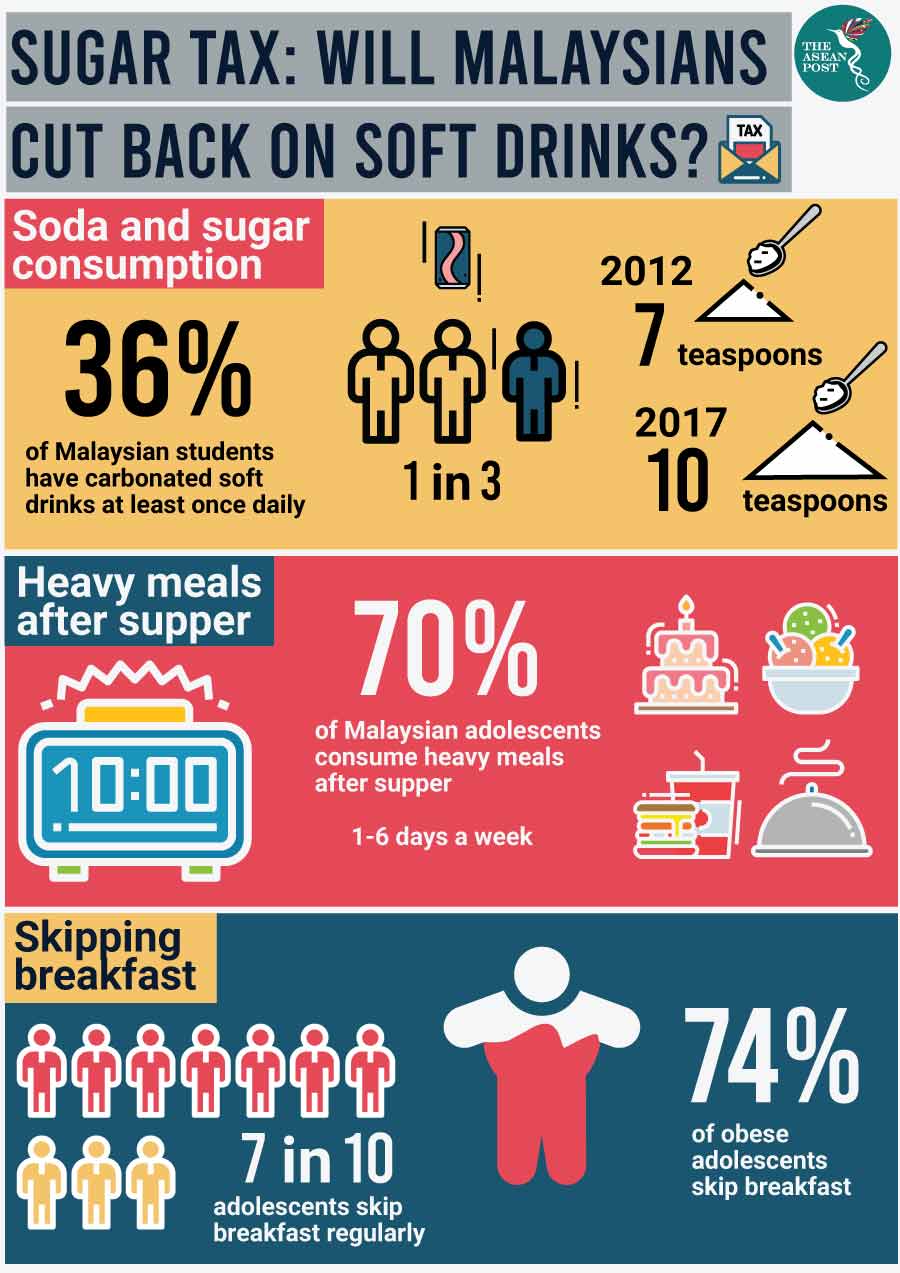Malaysia’s food culture may bond people together over a variety of meals. But this same food culture has led to 13.3 percent of Malaysians becoming obese, the highest among Southeast Asian countries.
According to a United Nations International Children's Emergency Fund (UNICEF) survey, 12.7 percent of Malaysian children aged five to 19 years old are obese, the second highest in Southeast Asia behind Brunei. Most alarming is that 7.1 percent of overweight Malaysian children are under the age of five.
There are economic implications as a result of rising obesity in Malaysia. In 2017, the total health related costs of obesity accounted for 0.54 percent of the country’s gross domestic product (GDP) or US$1.7 billion, not including the indirect costs of loss of labour productivity due to absenteeism or medical leave. 73 percent of deaths in Malaysia’s government hospitals are due to obesity-related health issues.
Passive lifestyle
The prevalence of obesity among Malaysia’s youth is mostly due to lifestyle and unhealthy eating habits. Diets among the youth are tainted by fast food, sugary treats and supersized portions.
A survey by the Institute of Public Health and the Ministry of Health Malaysia found that the average daily intake of sugar among Malaysian youths increased from seven teaspoons in 2012 to 10 teaspoons in 2017, which is more than the recommended limit for adults. Malaysians also consume an average of three kilograms of sugar per year in the form of sugary drinks. Survey results show that 36 percent of Malaysia’s youth drink carbonated drinks at least once a day. Sugary drinks contribute to weight gain and obesity and other diseases such as diabetes, heart disease, stroke and cancer.
The unhealthy habit of eating meals after 9 p.m. also contributes to the risk of obesity. According to the same survey by the Ministry of Health, 70 percent of Malaysia’s youth consume heavy meals after supper, one to six days a week. Research done by the Perelman School of Medicine at the University of Pennsylvania found that poor timing of meals can affect cholesterol levels and raise glucose and insulin levels, increasing the risk of diabetes and heart disease.

Eating breakfast promotes better weight management, while those who skip breakfast are at higher risk of heart disease and type 2 diabetes. Unfortunately, seven out of 10 Malaysian youths skip breakfast regularly.
Being severely overweight can have a significant effect on children’s health and well-being, which can eventually lead to serious and potentially life-threatening conditions. Obesity can also affect a child’s performance in school, caused by tiredness, sleep apnoea and difficulty with physical activity. Socially, obesity will affect a child’s self-esteem and for some, may lead to psychological conditions like depression.
Sugar tax
The Malaysian government implemented a sugar tax on 1 July to reduce the prevalence of obesity. According to Deputy Health Minister, Dr Lee Boon Chye, citing examples from other countries, there is evidence that a “sugar tax actually helped to reduce the consumption of sugar.”
Currently, 50 countries around the world have already implemented taxes on sugar-sweetened beverages (SSB), including Brunei, the Philippines and Thailand. The SSB tax in the Philippines is claimed to have reduced sugar consumption by 8.7 percent.
Preliminary analysis by UNICEF and the World Health Organization (WHO) on the SSB tax suggests that sugar-intake among Malaysians will be reduced and significant revenue could be raised which can be re-invested into programmes to improve nutrition and health. Fruit juices and sweetened milk-based drinks that have a high sugar content can also be taxed.
Supporters of the sugar tax look forward to curbing soaring obesity rates, although concerns have been voiced by lower income groups that SSB taxes may increase the cost of living. However, a poll recently conducted by the international survey agency YouGov for a local paper found that 59 percent of respondents said they would cut back on soft drinks while 13 percent said they would stop drinking sugary beverages altogether.
Balanced diets
The Ministry of Health in Malaysia has taken a school-based intervention to beat obesity in children by banning certain types of food from being sold in public school canteens. The banned food items include instant noodles, candies, preserved foods and carbonated drinks.
Now, only high quality and healthy school meals are allowed in canteens. However, spot-checks done by the ministry have shown that canteen food still has a long way to go in terms of nutrition, taste and appeal.
“Parents and school authorities such as teachers and school canteen operators serve as role models to the younger generation in adopting healthy eating while establishing a supportive environment,” says Director-General of Health, Ministry of Health Malaysia, Dr Noor Hisham.
Educational materials on healthy eating have been distributed in schools, but the main focus should be on the lifestyle of children, where exercise and a balanced diet are still the best ways to prevent or treat obesity.
The ‘food pyramid’ or ‘healthy eating plate’ are some of the few guided diagrams that can provide an easy understanding of dietary needs for children. Both diagrams represent the recommended intake for a specific food group and are the best dietary information available today.
Parents too must cultivate healthy eating habits among their children. Planning school lunches for children should also be a priority for parents. Children are the leaders of tomorrow and inculcating healthy lifestyles and good eating habits is imperative. Nonetheless, healthy eating practices for children should also come with the occasional sweet treat.
Related articles:
Healthcare costs in the region on the rise
